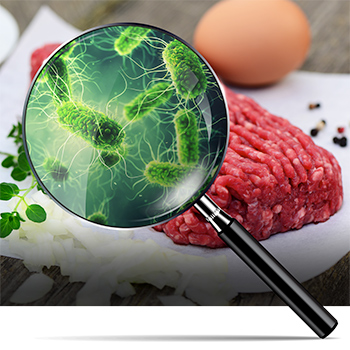
Salmonella is a bacterium that causes the infection salmonellosis. Salmonella germs were discovered over 100 years ago by an American scientist named Salmon, for whom they are named.
The most common symptoms are diarrhea, fever and abdominal cramps which develop 12 to 72 hours after infection. The illness usually lasts 7 to 10 days, and most people recover without the need for treatment. However, in some people, diarrhea may be so severe that the patient needs to be hospitalized. In these patients, the Salmonella infection may spread from the intestines to the blood stream and then to other body sites, which can cause death unless the person is treated promptly with antibiotics. Elderly persons, infants and those with impaired immune systems are more likely to have a severe illness.
Where Does Salmonella Come From?
Salmonella bacteria naturally live in you and in the digestive system of animals. The primary cause of Salmonella in people is foods contaminated with animal feces. Unfortunately, you cannot tell by look or smell if your food is contaminated. Beef, poultry, milk and eggs carry Salmonella since they are part of or come from animals that have the bacteria. However, more and more, vegetables have become contaminated with Salmonella due to irrigation with contaminated water supplies and cross-contamination during processing.
Pets, especially reptiles, such as turtles, lizards, and snakes, are particularly likely to be sources of Salmonella. Chicks and young birds also carry Salmonella in their feces.
How to Know You Have Salmonella and Not the Flu
Diarrhea, fever, or abdominal cramps are common to many conditions. To be sure you have Salmonella and not the flu, a laboratory test can identify the presence of the Salmonella bacteria in the stool or blood of an infected person.
Salmonellosis is More Common Than You Think
Every year, approximately 42,000 cases of salmonellosis are reported in the United States. However, because of mild cases that do not require medical treatment, failure to diagnose and/or cases not confirmed by a culture, scientists believe the true number of infections may be over 1.25 million. Some 400 persons die each year from acute salmonellosis. Children are the most likely to get salmonellosis, especially children under five years old, who have the highest rate.
Most People with Salmonella Do Not Need Treatment
The symptoms of Salmonella usually resolve in 7 to 10 days and often do not require treatment other than fluids to prevent dehydration. Severe diarrhea may require hospitalization and treatment with intravenous fluids. Unless the infection spreads from the digestive system, antibiotics are not usually necessary. In fact, strains of Salmonella become antibiotic resistant as a result of the over-prescription of antibiotics and use of antibiotics in the farming industry.
Long-Term Injuries Due to Salmonella are Rare
Almost everyone who comes down with Salmonella will be back to normal within 7 to 10 days, although it may be several months before their bowel habits are entirely normal. A very small number will develop reactive arthritis, which causes pain in joints, irritation of the eyes and painful urination. This can last for months or years and can lead to chronic arthritis which is difficult to treat. Whether or not you receive antibiotic treatment does not make a difference in whether or not you develop arthritis.
Quick Tips for Preventing Salmonella
- Cook poultry, ground beef, and eggs thoroughly. Do not eat or drink foods containing raw eggs, or raw (unpasteurized) milk. Raw eggs may be unrecognized in some foods, such as homemade Hollandaise sauce, Caesar and other homemade salad dressings, tiramisu, homemade ice cream, homemade mayonnaise, cookie dough and frostings.
- If you are served undercooked meat, poultry or eggs in a restaurant, don’t hesitate to send it back to the kitchen for further cooking.
- Cross-contamination of foods should be avoided. Uncooked meats should be kept separate from produce, cooked foods and ready-to-eat foods. Hands, cutting boards, counters, knives and other utensils should be washed thoroughly after touching uncooked foods.
- Produce should be thoroughly washed.
- Be particularly careful with foods prepared for infants, the elderly and people with weakened immune systems.
- Wash hands with soap after handling reptiles, birds, or baby chicks, and after contact with pet feces.
- Avoid direct or even indirect contact between reptiles (turtles, iguanas, other lizards, snakes) and infants or people with a weakened immune system.
- Don’t work with raw poultry or meat and an infant (e.g., feed, change diaper) at the same time.
Go to the CDC webpage to learn more about causes, prevention and symptoms of salmonella.
If you experienced serious consequences as the result of a Salmonella infection and have questions about your legal rights contact the experienced personal injury attorneys of JJS for a free case consultation.
RELATED POSTS
Food Poisoning” or Something Else? How to Tell
Listeria: A Rare but Deadly Bug
E. coli: The Good, the Bad and the Ugly
